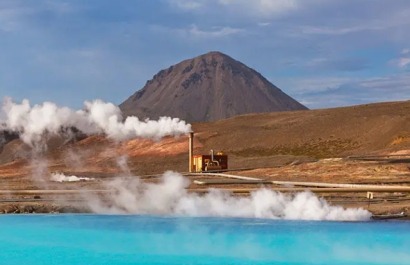
Geothermal energy – stored in the form of heat beneath the ground and the seabed – is the most underutilized energy source on the planet. It's the only sustainable energy source available every minute of every day. But it makes up just 0.5% of the renewable energy market worldwide, and most of the countries with the biggest geothermal sectors are outside Europe.
“Part of the difficulty is that as a low-temperature heat source, geothermal energy is inefficient at producing electric energy,” explained Prof Hussam Jouhara, the Brunel engineering expert who will be GEOFLEXheat's project coordinator. “However, if the heat energy can be used directly, rather than being converted to electricity, the efficiency would be close to 100%, regardless of temperature level.”
Jouhara is the leader of Brunel's Heat Pipe and Thermal Management Research Group and has revolutionized many sectors by developing novel heat-pipe-based technologies and heat exchangers through his collaboration with industry and while being the technical lead of the Horizon 2020 projects Etekina and iWays.
The GEOFLEXheat consortium will focus on geothermal brine: abundant warm underground waters that in some places, such as Iceland's famous Blue Lagoon, bubble up to the Earth's surface, rich with salts and minerals.
GEOFLEXheat will develop a system that combines a heat pipe heat exchanger with an innovative scaling reduction system, a high-temperature heat pump and thermal energy storage. When used together, these components will exploit the waste heat from a geothermal brine power plant; collect the otherwise corrosive salts and minerals into a valuable resource; and create a range of upgraded, cost-effective and consistent water temperatures, up to a 110°C steam, that will deliver what's needed for industrial applications and for district hot water.
The project will also deliver a state-of-the-art control strategy and digital twin: a virtual model that's updated from sensors studded throughout the system, enabling real-time management and optimization of geothermal plants.
“Overall, the project will showcase the full potential of geothermal energy to provide stable, affordable and sustainable heat supply,” said Jouhara.
Starting on Oct.1, GEOFLEXheat will run for 3 years, and is the first project that is coordinated by Brunel University London under the Horizon Europe program. To ensure its outcomes have a lasting impact, the consortium will create a spin-off company, carry out extensive environmental and economic assessments, and create a social acceptance guide to facilitate policy influence and community engagement.
“As part of our sustainable future, geothermal energy ought to be a cornerstone of Europe's renewable energy mix,” Jouhara added. “So GEOFLEXheat is poised to become a catalyst for energy sustainability, economic growth and environmental stewardship.”

